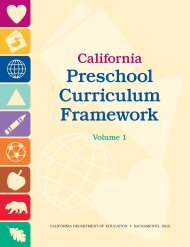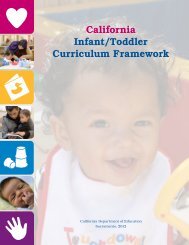California Preschool Learning Foundations - ECEZero2Three ...
California Preschool Learning Foundations - ECEZero2Three ...
California Preschool Learning Foundations - ECEZero2Three ...
You also want an ePaper? Increase the reach of your titles
YUMPU automatically turns print PDFs into web optimized ePapers that Google loves.
160<br />
Research suggests that children<br />
start developing number sense in early<br />
infancy (Feigenson, Dehaene, and<br />
Spelke 2004). Much of what preschool<br />
children know about number is closely<br />
related to and depends on their understanding<br />
and mastery of counting<br />
(Adding It Up 2001). Counting builds a<br />
foundation for children’s future understanding<br />
of mathematics, and this<br />
basic skill becomes the reference point<br />
as children learn to manipulate larger<br />
quantities in the future.<br />
Children’s understanding of numbers<br />
is initially qualitative, as they gain<br />
an understanding of “number-ness”<br />
(e.g., three-ness, four-ness) with small<br />
quantities, using subitizing: visually<br />
knowing “how many” are in a set without<br />
actually counting them (Clements<br />
2004a; Fuson 1988, 1992a). Counting<br />
is a natural activity for young children<br />
as their everyday contexts often involve<br />
numbers and quantities, although it<br />
requires them to have a sophisticated<br />
set of skills based on many experiences<br />
to be able to count accurately.<br />
Literature suggests that the three<br />
major basic building blocks for counting<br />
are learning of (1) the sequence of<br />
number words, (2) one-to-one correspondence,<br />
and (3) cardinality (knowing<br />
that the last number assigned to<br />
the last object counted gives the total<br />
number in the set) (Adding It Up 2001;<br />
Becker 1989; Clements 2004a; Fuson<br />
1988, 1992a, 1992b; Hiebert and<br />
others 1997; Sophian 1988). Children<br />
are likely to experience the aspects<br />
MATHEMATICS Number Sense<br />
Bibliographic Notes<br />
of counting at different times and in<br />
different contexts. As they gain more<br />
experience, they start to connect and<br />
coordinate these individual concepts<br />
and develop skill in counting with fluency.<br />
The specific ways in which these<br />
different aspects of counting develop<br />
depend largely on individual children<br />
and their experiences. Research, however,<br />
is in agreement that very young<br />
children (ages up to three) may be able<br />
to handle small quantities first (groups<br />
of two to three), and as they grow<br />
older, they are more likely to be able to<br />
manage larger sets (by age five, groups<br />
of 10). Cardinality is typically developed<br />
between the ages of three and<br />
four years (Fuson 1988). The preschool<br />
years are a critical time for children<br />
to master the art of counting small<br />
numbers of objects.<br />
Young children’s understanding<br />
of quantities and numbers is largely<br />
related to counting, as noted in the<br />
previous section. Another important<br />
factor in children’s development of<br />
number sense is early experience with<br />
number operations (Adding It Up 2001;<br />
Clements 2004a; Hiebert and others<br />
1997; Principles and Standards for<br />
School Mathematics 2000). Research<br />
shows that counting and number<br />
operations are related and that children<br />
as young as three years are able<br />
to understand simple visual number<br />
patterns that involve number operations<br />
such as, “two fingers and two fingers<br />
make four” (Fuson 1988, 1992a).<br />
When children enter elementary<br />
schools, much of their engagement<br />
<strong>Preschool</strong> <strong>Learning</strong> <strong>Foundations</strong>, Volume 1 • <strong>California</strong> Department of Education
















